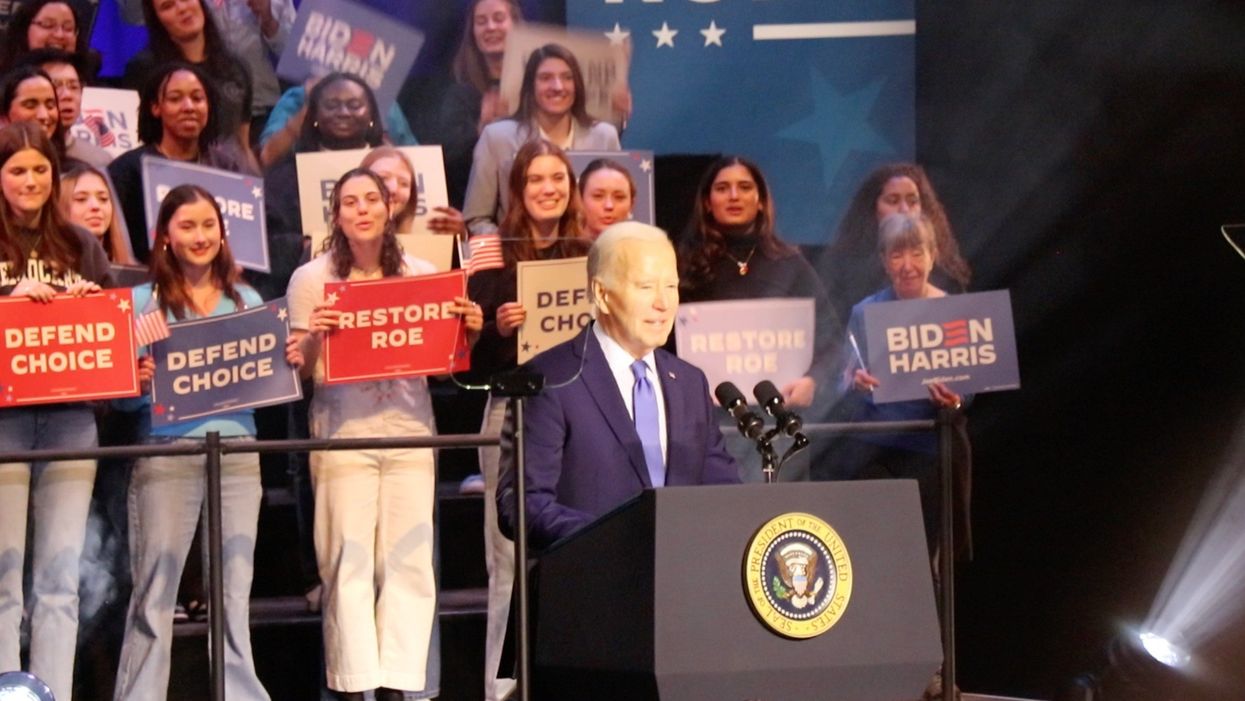Norman is a graduate student at Northwestern University's Medill School of Journalism.
Hoping to capitalize on the hottest issue for Democrats running for office in the past two years, President Joe Biden has made abortion a major plank of his re-election campaign. However, legal experts question what can be accomplished in such a polarized government.
Given that nearly every bill in the Senate must get the support of 60 senators and most efforts at compromise in the House of Representatives have not been successful, an expansion of abortion rights beyond the measures that the Biden administration has already taken seems unlikely.
Last month, at Biden’s first joint campaign event of the year with Vice President Kamala Harris, banners declaring “Restore Roe” hung above them. However, the slogan severely overstates what Biden can actually accomplish if re-elected, legal experts said.
In 2022, the Supreme Court overturned its own landmark Roe v. Wade decision, which had made abortion a constitutional right. If Biden were to attempt an executive order, it would likely be stopped by the court, and any legislative efforts to toss aside the Dobbs decision – the new legal standard – would not make it through either chamber of Congress.
Dobbs eradicated constitutional protections for a woman who chooses to seek an abortion. Since then, over 20 states have restricted abortion, including 14 states that set bans in almost all circumstances. The decision also eliminated a lot of roadblocks to expand abortion restrictions on the federal level.
“Even though there are constraints on what a Democratic president can do, there are a lot fewer constraints on what a Republican could do than we are used to,” said Mary Zeigler, expert on the politics of reproduction from University of California, Davis. “Executive action to restrict abortion rights hasn’t really been experimented with in the same way [as an expansion of rights], because we have always had Roe in the background.”
Since Dobbs, the threats to abortion access have aided Democratic candidates in close races where abortion was directly or indirectly on the ballot.
Heading Into the 2022 midterm elections, which took place only a few months after the Dobbs decision was released, Republicans predicted an electoral “red wave” would develop as voter expressed disappointment in the first part of Biden’s term. Instead, the GOP lost its Senate majority and barely maintained control of the House.
In 2023, Ohio voters approved a ballot initiative that would put the right to abortion and other reproductive rights into the state Constitution. In Virginia, Democrats held their majority in the state Senate and flipped the state’s House of Delegates. Democratic voters were primarily motivated to resist the threat of Republican Gov. Glenn Youngkin’s proposed 15-week abortion ban. Kentucky Gov. Andy Beshear, a Democrat, was also able to win re-election in a red state, defeating a challenger who strongly opposed abortion rights.
Biden’s move to make abortion rights a part of his campaign is less about what he would do to restore rights and more about what the probable GOP nominee, former President Donald Trump, would do if elected. Biden’s supporters were glad to see that he was giving proper attention to abortion rights.
“I have two daughters who are growing up with less rights than I did,” said Jessica Berg, a high school teacher from Virginia who teaches women’s and gender studies. She said it was important for the Biden campaign to signify how important reproductive rights are.
Trump appointed three Supreme Court justices, all of whom voted with the majority opinion in Dobbs. This angered voters like Kris Nelson, chair of Virginia’s Warren County Democratic Committee.
“People have got to realize how important their vote is. If we would have paid attention in 2016 with the Supreme Court, we would not be living this history right now,” she said.
When Biden finally took the stage, he heavily criticized Trump for the role that he played in the Dobbs decision.
“Let there be no mistake. The person most responsible for taking away this freedom in America is Donald Trump,” Biden said.
He also condemned the Republican Party as a whole, saying that “MAGA Republicans” are “hell bent” on taking restrictions further. However the only actual promise that Biden made was to “not sign” a bill banning abortion nationwide.
Biden has repeatedly stressed his support for a woman’s right to choose, but also acknowledged that without congressional support he cannot stop state actions that restrict abortion.
Instead, he used executive branch authority to ensure some protections for abortion access and related medication:
- The Food and Drug Administration and the Justice Department are fighting in federal courts to defend access to mifepristone, a drug used in medication abortions.
- Biden issued an executive order directing agencies to improve access to affordable, high-quality contraception.
- He empowered the Centers for Medicare and Medicaid Services to provide governors with increased access to care for women who travel from out of state to receive an abortion.



















Trump & Hegseth gave Mark Kelly a huge 2028 gift